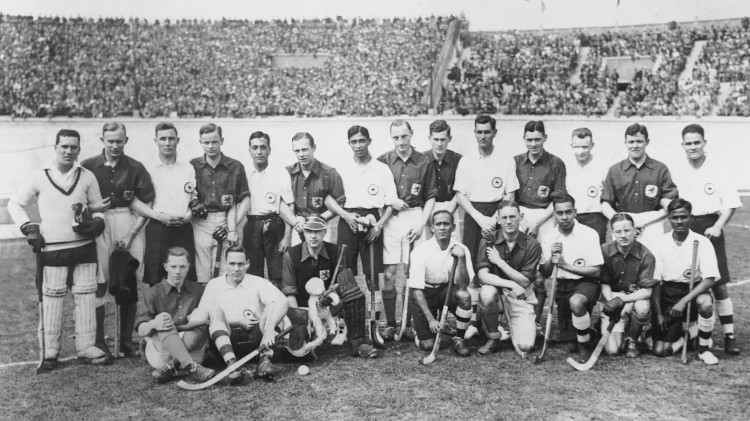
Article by Utathya Nag, courtesy
Olympics.com. Photograph credit Getty
 ockey was part of the Olympic programme at the 1908 and 1920
Games but India was a part of neither. This was because India lacked an official hockey governing body.
ockey was part of the Olympic programme at the 1908 and 1920
Games but India was a part of neither. This was because India lacked an official hockey governing body.
The Indian Hockey Federation (IHF) was established in 1925, and later became a part of the
International Hockey Federation (FIH) in 1927. That changed the
landscape and India were set to mark their hockey debut at the following year's Olympic Games in Amsterdam.
The IHF named a 16-member squad, featuring nine
Anglo-Indians and seven Indians, including Dhyan Chand. Thirteen of
the team members would sail to Amsterdam from Bombay, while three - Jaipal Singh, Iftikhar Ali Khan
Pataudi and S. M. Yusuf - were to join the
team in England during a layover. Pataudi eventually dropped out of the team.
The Olympic team's preparations in India were muted, with the
team losing 3-2 to Bombay during a practice match. Few expected a medal
from Amsterdam, but the team was confident of "avoiding any disgrace" in the tournament.
As the Indian hockey team set sail for Amsterdam from Bombay port, only three people
- the then IHF president, vice-president and a solitary journalist - came to see them off.
During a 20-day layover in England, the Indian team played several practice matches and caught the attention of the
European media. Jaipal Singh was the designated captain. A Munda tribal,
Jaipal was sent to London by missionaries to study in Oxford and had
earned his name as a hockey player in England, including a spread in the prestigious World Hockey magazine.
The Indian team's victories in England featured a 4-0 drubbing of
Hockey Association of England XI in an exhibition match at the Folkestone
festival. England had won gold medals at both the 1908 and 1920 Olympic
hockey events. After the defeat to India at Folkestone, England withdrew their team from the
1928 Olympics. The English team re-emerged at the 1948 Olympics - only after India became independent.
At the time, Jaipal was studying for
the Indian Civil Services (ICS) in Britain and wasn't granted leave to
participate in the 1928 Olympics. He, however, paid no heed to warnings
and travelled to Amsterdam with the squad.
A total of nine teams participated in the 1928 Olympics hockey event.
India, with Belgium, Denmark, Switzerland and Austria were drawn in
Division A while hosts the Netherlands, with Germany, France and Spain
were in Division B. The topper of each group would face each other for the
gold medal, while the second-placed teams of each pool would played for the bronze.
India's debut match saw Dhyan Chand emerge as an unstoppable force in
world hockey. Dhyan Chand already had a reputation preceding him
after his brilliant showing in the Indian hockey team's maiden foreign
tour to New Zealand in 1926. But this was
the first time his wizardry with the stick found its rightful stage on
the biggest sporting event on the planet.
Dhyan Chand scored four against Austria in India's opening match to
help his team to a 6-0 win. In the next match, Feroze Khan top-scored with five as India
ran away as 9-0 winners against the Belgians. Dhyan Chand scored
back-to-back hat-tricks in the next two matches as India thrashed
Denmark 5-0 and Switzerland 6-0.
Having topped their pool with a 100 per cent record, India set up
a final against the the Netherlands, who had won the other pool.
Heading into the big match on May 26, 1928, India faced a few odds.
Feroze Khan was ruled out due to a broken collarbone he suffered in the
match against Denmark, while Shaukat Ali and Dhyan Chand were down with fever.
As Dhyan Chand noted in his autobiography: "I was running a high
temperature which persisted all through the game. For me there was no
option. I was a soldier by profession, and when the country's honour was
at stake, there was no alternative but to march boldly into the battlefield."
The wizard scored a brace as India beat the
host nation 3-0 in front of 50,000 Dutch fans, half watching from inside
and the rest waiting outside the Olympisch Stadion in Amsterdam.
Dhyan Chand finished as the top-scorer in the tournament, scoring 14 of India's 29 goals.
This was the first Olympic gold medal won by Asia in the modern Olympics.
When the hockey team returned from the Netherlands,
thousands of fans, including eminent dignitaries, thronged Mole Station
(adjoining railway station of the old Bombay pier) to greet the triumphant heroes.
And what happened to the captain? Jaipal cleared his ICS finals but was penalised
for going to Amsterdam and was asked to repeat the year. Jaipal resigned in protest and returned to India.
![]()